The Northman © Universal Pictures.
The Northman was another Hollywood movie that I wanted to see in theaters but missed. Just like The Last Duel, even if the movie ended up being bad (which they weren't), I wanted to see it in theaters to support the continued production of movies like this -- movies that aren't just another in the endless onslaught of comic book movies and nostalgia reboots from the late 80's and 90's. I want Hollywood to keep making these sorts of serious historic dramas.
But I haven't been to a movie theater in over 2 years thanks to the COVID pandemic. I would have been willing to go to the theaters for this (as well as for The Last Duel), but stuff kept coming up. We kept putting it off until, before we knew it, The Northman was out of theaters. But I'm no hypocrite. I also haven't seen any comic book movies in theaters either. I waited to see Spider-Man: No Way Home and The Batman until they were on streaming, and I still haven't seen Multiverse of Madness.
Much like The Last Duel, Northman is a brutal and dirty movie. Nobody gets blood-eagled, but there is plenty of violence, both grotesque and cathartic. Even the non-violent parts of the movie are grotesque and intense. Grown men built like trucks scream at each other, dance around, and even occasionally cry. This movie is constantly bombarding the audience with weird stuff, and it's all mesmerizing.
Northman threads a fine line between completely believable historical fiction and some mythological elements. On the one hand, I would believe the movie if it told me that it was inspired by true events. On the other hand, it's never entirely clear if the mythological content is actually supposed to be interpreted as really happening, of if they simply reflect the characters' belief in their gods and magics. Either way, the gritty, dirty, realistic settings are occasionally juxtaposed with beautiful and imaginative fantastical imagery.
 © Universal Pictures
© Universal Pictures
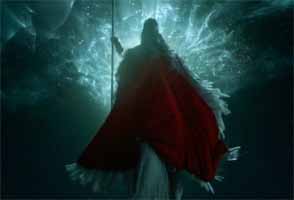 © Universal Pictures
© Universal Pictures
The gritty, realistic setting is juxtaposed with imaginative fantastical imagery.
[More]
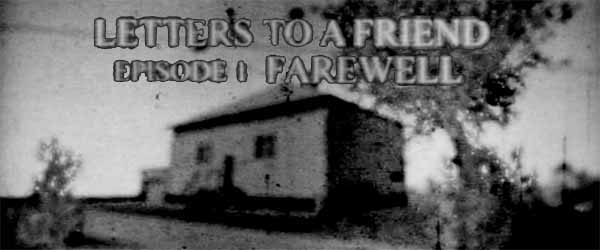
When I saw Errant Signal's video essay about Letters To A Friend: Farewell, I was instantly intrigued. Even watching someone else's footage, and not actually playing myself, the exceedingly grainy camera had me seeing things that weren't there, constantly wondering if something was going to pop out of the shadows. In a slow-burn psychological horror title like this, that kind of constant tension really helps to set a mood and elevate the emotional response to the game, and I wanted to experience it for myself.
Letters To A Friend is a short, 30 to 40-minute indie horror game with a unique silent film aesthetic. Aside from ambient background music, there is no dialogue and no sound effects. All the spoken dialogue and inner monologue of the player character are conveyed through text displayed on static title cards. The entire game is played in monochrome, with a heavy vignette and film grain effect.
Letters To A Friend is absolutely committed to its grainy silent film aesthetic.
The plot is about a notary who goes to a house so that the owner, Markus, can sign away his rights to inherit the property after his father had recently passed. Markus begins rambling, claims he can't find the key to the locked attic door, the time grows late, and the notary is asked to stay overnight in the study, so that Markus can find the key and sign the paperwork the next morning. The notary agrees, only to have his sleep disturbed by weird noises and odors, which are all described in text on title cards. Something is not as it seems.
I don't want to go into further detail right away because speaking any further about the plot or themes of this 40-minute story would completely spoil it. This game is short even by walking sim standards, but on the upside, at least it gets straight to the point without burying its meaning in layers of confusing metaphor and symbolism, as many walking sims are prone to do. This game is only available on itch.io, and its recommended price is $5.99 USD, but since it's on itch, you can opt to pay more if you want to help support the developer. Personally, I paid an even $7 USD. If you don't mind short, indie walking sims, and the silent film aesthetic looks interesting, then I recommend checking this game out and playing for yourself. Then feel free to come back and read the more spoiler-y details of the review and analysis. [More]
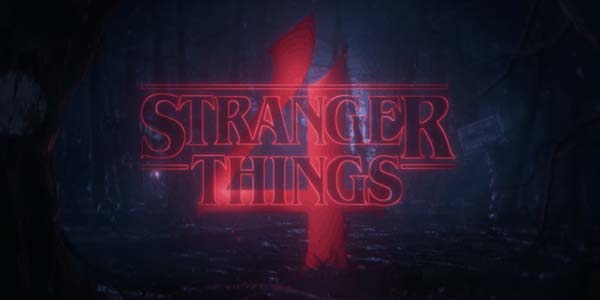
I never bothered reviewing the 3rd season of Stranger Things because I didn't really have strong feelings about it one way or the other. Season 3 was a bit of an improvement over season 2, but both were a resounding "meh" for me. The first half of season 4 is also kind of "meh", but I think that it's worth talking about this time around because it both succeeds tremendously where seasons 2 and 3 failed, but also then kind of ruins any goodwill that it had built up.
The fundamental problem that I have with Stranger Things after the first season is that a continuation of this same story simply doesn't need to happen. The first season worked so well, in large part, because of its intriguing mysteries. Aside from sequel bait, all the important questions and mysteries of season 1 were solved, and the first season felt satisfactorily resolved. If this show was going to have sequel seasons, then I think a more anthology-like approach would have been more appropriate, with each new season telling a new story, with new characters, confronting a completely new and unrelated horror, and solving completely new and unrelated mysteries.
By continuing with the same story, the audience gets to bring everything we know from the first season into the new story. Even though seasons 2 and 3 went in their own directions and took different inspirations compared to the first season (season 1 being kind of Twin Peaks meets E.T., season 2 being inspired by Aliens and Terminator, and season 3 being a play on a Body-Snatchers concepts), neither season 2 nor 3 introduced anything tremendously new. There wasn't much mystery because the workings of the Upside Down, the mechanics of the demogorgons, and the machinations of the secret government labs were all established. Season 3 shakes things up a bit with a body-snatchers plot and an ending that actually destroys the status quo and moves our characters forward with their lives, and is perhaps the only reason that season 3 did not feel quite as stale (for me) as season 2 did. But the fundamental problem was still the same: we've seen all this before, more or less.
Season 4's "monster of the week" approach feels fresh and new.
This is where season 4 kind of shines. It's new monster, Vecna, isn't just another demogorgon. He's something that feels completely new and threatening. His motivations are unknown, and despite being explicitly inspired by Freddy Krueger, the mechanics by which he operates are completely new compared to the previous monsters. This finally gives our characters an actual mystery to solve. For the first time since season 1, the threat of Stranger Things is finally mysterious and unknown again. [More]
 © CBS, Paramount
© CBS, Paramount
I'm not going to wait till the end of the review this time to say this. I want to get it out of the way right up front. Paramount needs to get some actual science fiction writers (preferably ones who have worked on Star Trek in the past) and science and technical consultants into the writing rooms for their Star Trek shows. And furthermore, the TV writers in the room need to listen to those sci-fi writers and consultants. Not only does the second season of Star Trek: Picard fall apart due to sloppy, incoherent plotting, but it also seems painfully unaware of certain parts of Trek canon and also of how metaphor and allegory are supposed to work.
I previously wrote an outline of my ideas for re-writing the first season of Picard to retain all the good ideas, get rid of the bad, and create something that more closely resembles the type of Star Trek that I want to see. But I don't think I can do that for this season of Picard because nothing in this show makes any sense.
I was actually kind of optimistic at the start. The first 2 episodes were actually not bad, and seemed to go out of their way to try to rectify some of the complaints that were levied against season 1. This time around, the Federation is not depicted as racist cowards who are unwilling to help a refugee population fleeing from a natural catastrophe. In fact, they give long speeches about the duty of Starfleet to explore the unknown and about the value of diversity and inclusion. We still see a version of the Federation that is racist and xenophobic, but this time, it's in the form of a parallel reality fascist Confederation. The first episode is even about a starship investigating a strange anomaly in space. This is an OK start. This actually kind of sort of looks like Star Trek.
 © CBS, Paramount
© CBS, Paramount
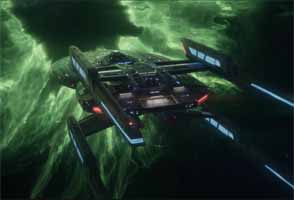 © CBS, Paramount
© CBS, Paramount
Season 2 starts off promising, with the Federation looking more like what I'm used to,
and the opening episode seemingly including an "anomaly of the week".
Problematic developments
But even from this first episode, the cracks in the storytelling are already exposed. Problem number one is that all the important character development happened off-screen between seasons. Rios apparently got over his trauma, went back to Starfleet, and was given a captaincy. He even broke up with Jurati. Good riddance. Seven and Raffi also had a relationship and then a falling-out -- all off-screen. Raffi developed some sort of proxy-parent / mentor relationship with Elnor, who also joined Starfleet, and is somehow already on a deep space assignment less than a year after enlisting. Meanwhile, Larin's husband died, and she's secretly fallen madly in love with Picard, who is now an instructor or headmaster at Starfleet Academy. Soji is an ambassador between the synths and the Federation and isn't involved in season 2 at all, despite having been the lynchpin of the first season.
The character development that happens during season 2 isn't any better. This season Fundamentally changes Picard's character. He was already unrecognizable as the same Jean-Luc Picard from The Next Generation in season 1, but I'm willing to give a pass due to the decades of time in between. People change over decades, especially if their life circumstances have also dramatically changed. Picard went from being a Starfleet captain exploring the galaxy, to sitting around his chateau with his Romulan not-slaves, sipping wine and petting dogs. Fine, I get that he's mellowed since the end of TNG.
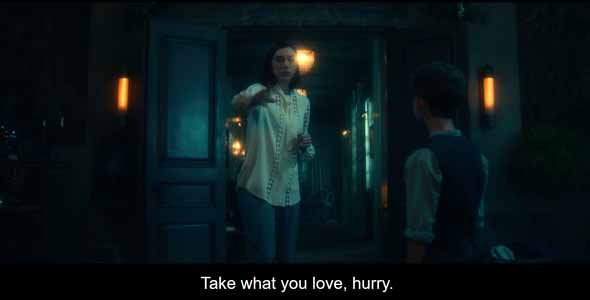 © CBS, Paramount
© CBS, Paramount
Picard's past is ret-conned to include a mentally ill mother and toxic home environment
being the reason he left home for the stars.
But season 2 actually goes back and retcons Picard's entire life in ways that reframe his entire character from TNG. He isn't the consummate explorer who joined Starfleet because of a genuine love of science and discovery. Now, he joined Starfleet to get away from a toxic home environment. It's just like how reboot James Kirk didn't join Starfleet because of a desire to explore, but because he was double-dog-dared to be a better Starfleet officer than his dead dad. But at least in Kirk's case, that is a different character in a different timeline. In Picard's case, we're supposed to believe this is the same Picard that we've known all along.
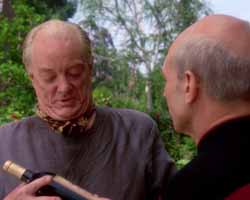 TNG s4 e2 "Family", © CBS, Paramount
TNG s4 e2 "Family", © CBS, Paramount
Where was Robert during all this family drama?
Also, did the writers not know that Picard had an older brother? Where was Robert Picard during all this drama with their parents?
And Seven of Nine has apparently regressed from any of her character development from the previous season, as she's back to mindlessly killing Borg and insisting that they "aren't human anymore". This is despite the fact that both she and Picard are case in point examples of former Borg being rehabilitated, and despite her sorrow of the destruction of the Borg Rehabilitation Project in season 1.
The lynchpin of this season is a young astronaut who suffers from crippling depression. This is despite the fact that NASA has pretty extensive screening and training processes that would either rule out someone who is not emotionally stable enough to do the job, or would train them to the point that they do the job without a second thought. This is an example of how having science and technology consultants in the writing room would help make the story more believable. [More]
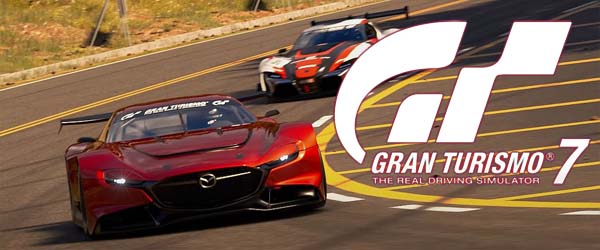
I recently published a video to YouTube explaining how playing Gran Turismo 7's weird campaign reminded me of why I stopped playing Gran Turismo games to begin with. This video is not a full review of Gran Turismo 7, since I don't do video reviews. It's more a retrospective of my history with the franchise, why I chose to buy GT7, and my reaction to the game's campaign and reward structure. Not to mention some obligatory jabs at the game's awful, scammy, and borderline fraudulent bait-and-switch monetization scheme. Even though this isn't a proper review, it does echo much of the content of my original blog review, so I invite you to check that out. And since the review already contains most of the points made in the video, I'm not going to transcribe the entire video in text.
Gran Turismo 7 reminded me why I stopped playing Gran Turismo.
In summary, I have felt that since around Gran Turismo 4, the games have shifted to being more about collecting cars than about actually driving or racing them. Reward cars are given out like candy, leading to a garage full of cars that I never drive and which I don't feel I really earned. There's no attachment or sense of ownership over the cars, and they just don't feel like my cars in the way they did in the first Gran Turismo. That first game required greater investment to win prize cars, making them feel more earned, and it put a greater emphasis on tuning the cars in the garage to get the best performance out of them. Buying my own cars and meticulously tuning them really created that sense of ownership that is just lacking in GT7.
I also want to emphasize that I do not hate Gran Turismo 7. Even though I dislike the campaign and its reward structure, and even though the monetization model is despicable, the actual driving is absolutely fantastic! Especially with the Dual Sense controller on the PS5. I am particularly impressed with how well the Dual Sense's motion controls work for steering the car. There's some nifty haptic feedback features as well, but steering the car with the motion sensor is an absolute game-changer. So the campaign may suck, but I'm still playing GT7 on a regular basis because of how much I enjoy the driving. I've been alternating between GT7 and Elden Ring.

So anyway, I hope you enjoy the linked video. Feel free to share your own experiences with the game in the comments, either here on the blog, or on the YouTube video. And remember, all my content is funded by the support of readers and viewers like you through Patreon. So if you enjoy this content, I hope you'll consider contributing to help support the creation of further content. And if you do decide to join as a Patron, then, first of all: thank you! And secondly, don't forget to fill out the Patreon Entry Survey and tell me what content you enjoy the most. [More]
399a22fb-8511-4ab1-b635-e2dadc105c07|0|.0
Tags:Gran Turismo, Gran Turismo 7, Sony, PlayStation 5, Dual Sense controller, adaptive trigger, motion control, haptic feedback, Polyphony, car, history, racing, driving, steering, collecting, Pokemon, pre-order, micro-transactions, grind, always online, YouTube
|

| 12 | | | | | | | 60 | | 11 | | | | | | | 55 | | 10 | | | | | | | 50 | | 09 | | | | | | | 45 | | 08 | | | | | | | 40 | | 07 | | | | | | | 35 | | 06 | | | | | | | 30 | | 05 | | | | | | | 25 | | 04 | | | | | | | 20 | | 03 | | | | | | | 15 | | 02 | | | | | | | 10 | | 01 | | | | | | | 05 |
|